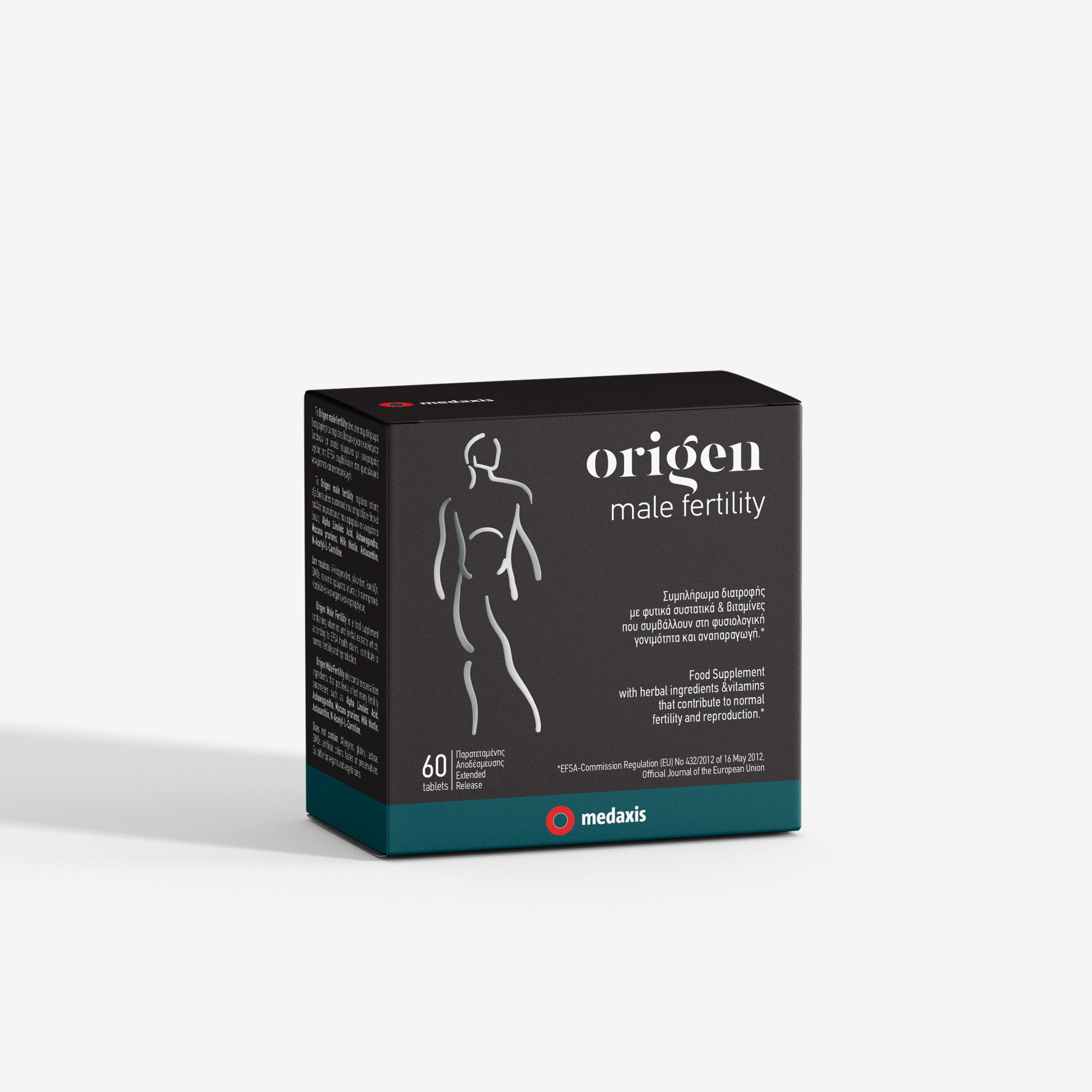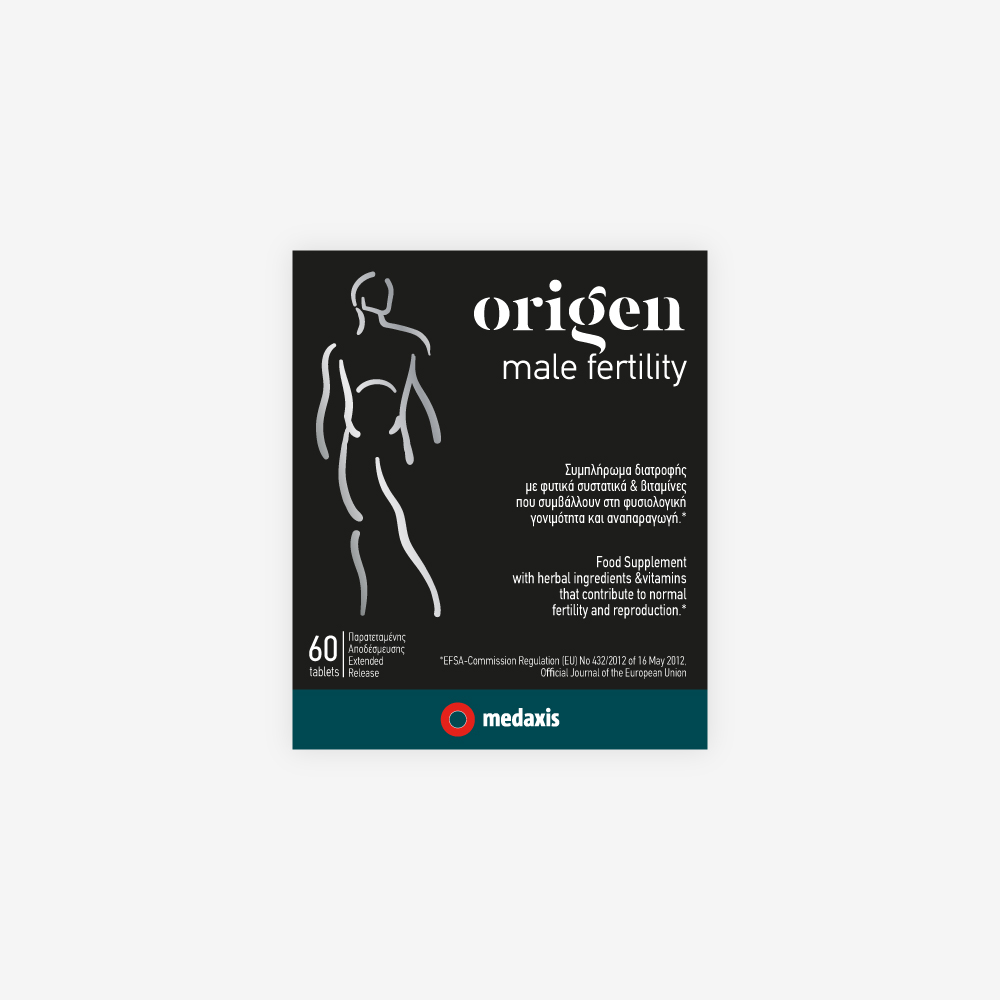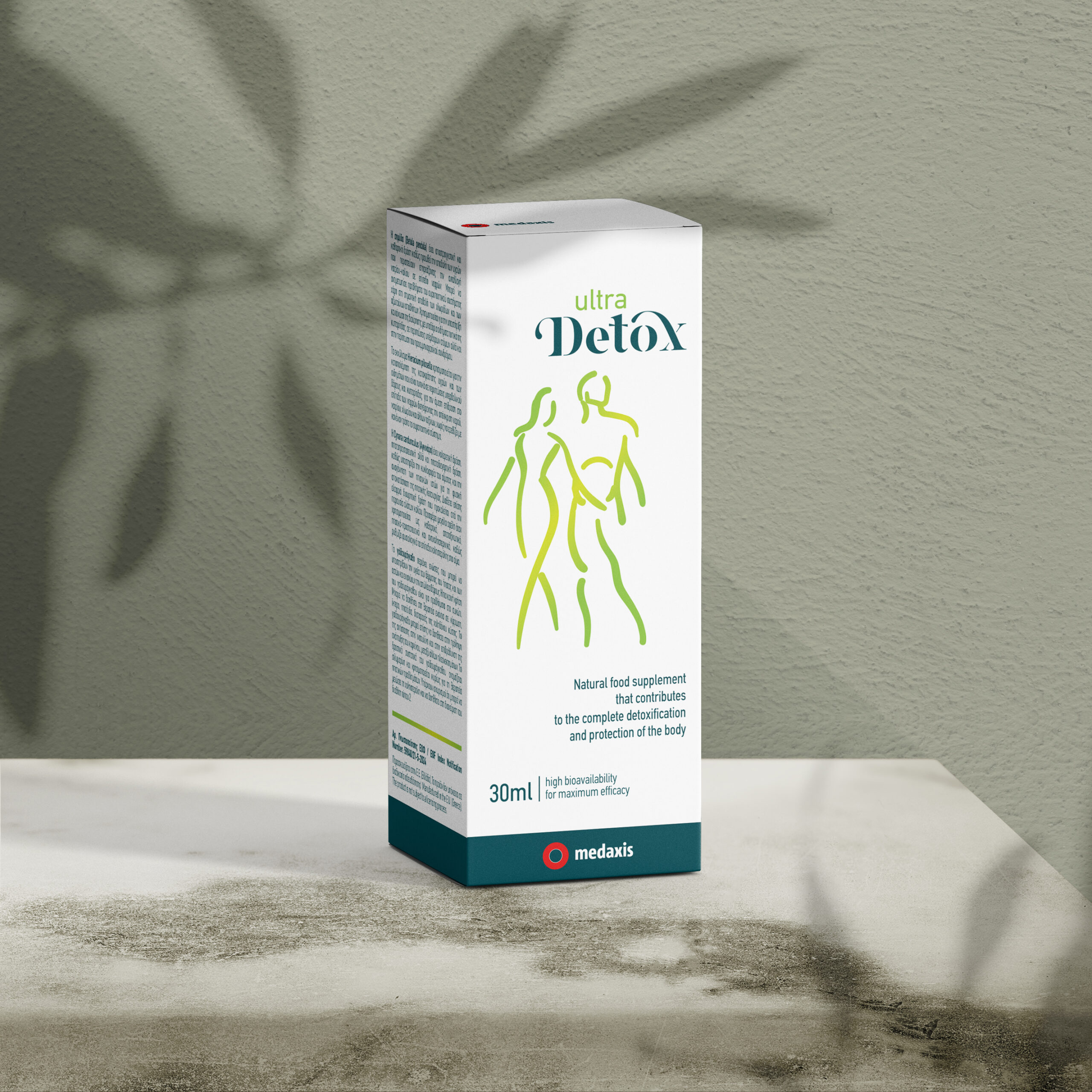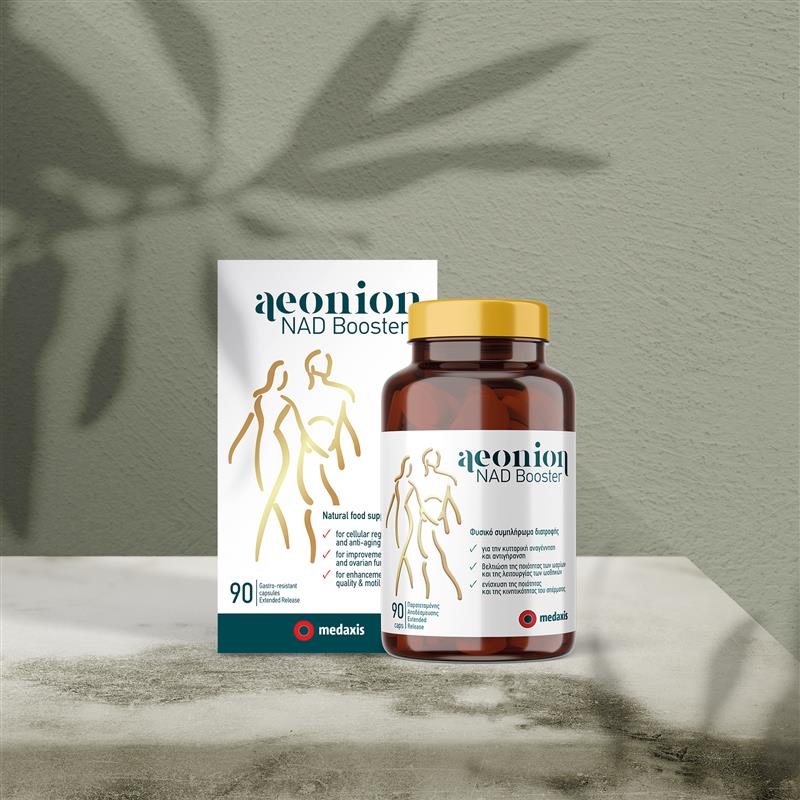Origen Male Fertility
60 tables | Extended Release | Food Supplement with herbal ingredients & vitamins that contributes to normal fertility and reproduction.*
*EFSA-Commission Regulation (EU) No 432/2012 if 16 May 2012.
Official Journal of the European Union
Does not contain allergens, gluten, lactose , GMOs, artificial colors, tastes or preservatives. Suitable for vegans and vegetarians.
€90.00 inc VAT 5%
Introduction
Infertility refers to a problem of the reproductive system that results in a couple not being able to conceive (ie achieving a pregnancy), or a pregnancy coming to an end. The definition accepted according to the World Health Organization characterizes a couple as infertile in the absence of conception after at least one year of regular intercourse, without the use of contraceptive methods. Regular intercourse refers to a frequency of intercourse of two to three times a week. The period of one year is reduced to six months when the woman is over 35 years old. [1] Infertility is not a new situation, but it seems to have increased in rates over the last few decades. Internationally, 15% of couples of reproductive age (estimated at 50-80 million people) have a fertility problem. [2]
In Greece, it is estimated that there is a higher rate of infertility (18-20%), a finding that is attributed to the high frequency of gynecological problems (eg uterine adhesions, fallopian tube occlusions), a result of limited sexual education of young people (multiple abortions, low rate use of the contraceptive pills or condoms, a large number of pelvic inflammations) in combination with the fact that today the Greek woman conceives at an older age. There are a wide variety of factors that can affect a couple’s fertility. The presence of one of these factors does not exclude the existence of another in the same pair, while one factor may have a different importance in each couple. For this reason we should consider to investigate and treat infertility as a problem of the couple and not of one or the other partner individually. 40% of infertility cases are due to the male, 40% to the female while 20% are related to problems that exist in both. In some cases, the causes of infertility remain unclear. This condition affects 10-15% of infertile couples and is known as unexplained infertility. Although a complete screening of both male and female proves to be perfectly normal, unexplained fertility problems are likely to be a combination of various, minor factors. The good news is that couples with unexplained infertility have the highest rates of normal (spontaneous) pregnancy among all infertile couples. [3-5].
Origen Male Fertility is a food supplement containing vitamins and herbal extracts which, according to EFSA health claims, contribute to normal fertility and reproduction [6].
Does not contain:
Allergens, gluten, lactose , GMOs, artificial colors, tastes or preservatives. Suitable for vegans and vegetarians.
Packaging:
Available in packs of 60 tablets that last 1 month.
Dosage:
1 tablet, twice a day with meals (preferably morning and evening) or as directed by a healthcare professional. Origen male fertility should be taken regularly for a period of at least 3 months. Its use can and should continue until conception takes place.
References
- G.I. Meniru, Gambridge guide to infertility management and assisted reproduction. Press syndicate of the University of Cambridge.
- Χ. Μήτση, Κ. Ευθυμίου, Υπογονιμότητα: Ψυχολογικές - ψυχοπαθολογικές επιπτώσεις και γνωσιακές - συμπεριφορικές παρεμβάσεις. Ψυχιατρική 2014, 25:293–302.
- M.O. .zkaya, M.Nazıroğlu, C. Barak, M. Berkkanoglu, Effects of multivitamin/mineral supplementation on trace element levels in serum and follicular fluid of women undergoing in vitro fertilization (IVF). Biol Trace Elem Res (2011) 139:1–9.
- C. Ross, A. Morriss, M. Khairy, Y. Khalaf, P. Braude, A. Coomarasamy, T. El-Toukhy, A systematic review of the effect of oral antioxidants on male infertility. Reproductive BioMedicine Online (2010) 20, 711– 723.
- E.H. Ruder, T.J. Hartman, J. Blumberg and M.B. Goldman, Oxidative stress and antioxidants: exposure and impact on female fertility. Hum Reprod Update. 2008 ; 14(4): 345–357.
- Commission regulation (EU) No 432/2012 of 16 May 2012, Official Journal of the European Union.
- M. R. Safarinejad, Effect of omega-3 polyunsaturated fatty acid supplementation on semen profile and enzymatic anti-oxidant capacity of seminal plasma in infertile men with idiopathic oligoasthenoteratospermia: a double-blind, placebo-controlled, randomized study. Andrologia. 2011 32 33 Feb;43(1):38-47.
- S.J. Bhathena, E. Berlin, J.T. Judd, Y.C. Kim, J.S. Law, H.N. Bhagavan, R.Ballard-Barbash and P.P. Nair, Effects of omega 3 fatty acids and vitamin E on hormones involved in carbohydrate and lipid metabolism in men. Am J Clin Nutr 1991;54:684-8.
- F.H. Comhaire, A. Mahmoud, An Update on Treatments and Interventions for Male Infertility, and the Role of Nutriceutical Food Supplementa- tion. J. of Pharm. and Nutr. Sciences, 2013, 3, 1-16.
- F.H. Comhaire, Y.E. Garem, A. Mahmoud, F. Eertmans, F. Schoonjans, Combined conventional/antioxidant .Astaxanthin . treatment for male infertility: a double blind, randomized trial. Asian J Androl 2005; 7 (3): 257–262.
- Shukla G. et al., Astashine capsules: an excellent choice to improve sperm parameter and fertility. Med. Res. Chron., 2016,3 (5), 328-332.
- V.R. Ambiye, D. Langade, S. Dongre, P. Aptikar, M. Kulkarni and A. Dongre, Clinical Evaluation of the Spermatogenic Activity of the Root Extract of Ashwagandha (Withania somnifera) in Oligospermic Males: A Pilot Study. Evid Based Complement Alternat Med. 2013; 2013:571420.
- Ashish Gupta, Abbas Ali Mahdi, Kamla Kant Shukla, Mohammad Kaleem Ahmad, Navneeta Bansal, Pushplata Sankhwar, Satya Narain Sankhwar, Efficacy of Withania somnifera on seminal plasma metabolites of infertile males: A proton NMR study at 800 MHz. Journal of Ethnopharmacology 149 (2013) 208-214.
- Mohammad Kaleem Ahmad, Abbas Ali Mahdi, Kamla Kant Shukla, Najmul Islam, Singh Rajender, Dama Madhukar, Satya Narain Shankhwar and Sohail Ahmad, Withania somnifera improves semen quality by regulating reproductive hormone levels and oxidative stress in seminal plasma of infertile males. Fertility and Sterility Vol. 94, No. 3, August 2010.
- Azza I. Othman, Mohamed A. El-Missiry, Khaled M. Koriem, Aml A. El-Sayed, Alfa-Lipoic acid protects testosterone secretion pathway and sperm quality against 4-tert-octylphenol induced reproductive toxicity. Ecotoxicology and Environmental Safety 81(2012)76–83.
- Mohamed F. Raaia, Ahmed A. Atyeah, Yasser I. Elkhiat and Hossam G. Elenany, Treatment of idiopathic asthenozoospermia, either isolated or oligoasthenozoospermia, with a-lipoic acid: a placebo-controlled, double-blind study. Human Andrology 2012, 2:94–98.
- Xin Zhou, Fang Liu and Suodi Zhai, Effect of L-carnitine and/ or L-acetyl-carnitine in nutrition treatment for male infertility: a systematic review. Asia Pac J Clin Nutr 2007;16 (Suppl 1):383-390.
- Elham Aliabadi, Malek Soleimani Mehranjani, Zahra Borzoei, Tahereh Talaei-Khozani, Hossein Mirkhani, Hamed Tabesh, Effects of L-carnitine and L-acetyl-carnitine on testicular sperm motility and chromatin quality. Iran J Reprod Med Vol. 10. No. 2. pp: 77-82, March 2012. 34 35
- Janice Post-White, Elena J. Ladas and Kara M. Kelly, Advances in the Use of Milk Thistle (Silybum marianum). Integrative cancer therapies 6(2); 2007 pp. 104-109.
- Giancarlo Balercia et al. Coenzyme Q10 treatment in infertile men with idiopathic asthenozoospermia: a placebo-controlled, double-blind randomized trial. Fertility and Sterility Vol. 91, No. 5, May 2009.
- Mohammad Reza Safarinejad, Efficacy of Coenzyme Q10 on Semen Parameters, Sperm Function and Reproductive Hormones in Infertile Men. The Journal of Urology Vol. 182, 237-248, July 2009.
- S. Pilz, S. Frisch, H. Koertke, J. Kuhn, J. Dreier, B. Obermayer-Pietsch, E. Wehr, A. Zittermann, Effect of Vitamin D Supplementation on Testosterone Levels in Men. Horm Metab Res. 2011 Mar;43(3):223-5.
- Wai Yee Wong et al. Effects of folic acid and zinc sulfate on male factor subfertility: a doubleblind, randomized, placebo- controlled trial. Fertility and sterility vol. 77, No. 3, March 2002.
- Laurel E Murphy et al. Folate and vitamin B12 in idiopathic male infertility. Asian Journal of Andrology (2011) 13, 856–861.
- Lynn M. Wallock et al. Low seminal plasma folate concentrations are associated with low sperm density and count in male smokers and nonsmokers. Fertility and sterility vol. 75, No. 2, Feb 2001.
- Mohammad K Moslemi, Samaneh Tavanbakhsh, Selenium– vitamin E supplementa- tion in infertile men: effects on semen parameters and pregnancy rate. International Journal of General Medicine 2011:4 99–104.
- L. Keskes-Ammar et al. Sperm oxidative stress and the effect of an oral vitamin E and selenium supplement on semen quality in infertile men. Arch Androl. 2003 Mar- Apr;49(2):83-94.
- Chia SE, Ong CN, Chua LH, Ho LM, Tay SK, Comparison of Zinc Concentrations in Blood and Seminal Plasma and the Various Sperm Parameters Between Fertile and Infertile Men. J Androl. 2000 Jan-Feb;21(1):53-7.
- Akinloye O, Abbiyesuku FM, Oguntibeju OO, Arowojolu AO, Truter EJ. The impact of blood and seminal plasma zinc and copper concentrations on spermogram and hormonal changes in infertile Nigerian men. Reprod Biol. 2011 Jul;11(2):83-98.
- Ahmad MK, Mahdi AA, Shukla KK, Islam N, Jaiswar SP, Ahmad S, Effect of Mucuna pruriens on semen profile and biochemical parameters in seminal plasma of infertile men. Fertil Steril. 2008 Sep;90(3):627-35.
- Ahmad MK, Shukla KK, Bansal N, Jaiswer SP, Shankhwar SN. A proton NMR study of the effect of Mucuna pruriens on seminal plasma metabolites of infertile males. J Pharm Biomed Anal. 2011 Jul 15;55(5):1060-6.
Additional information
| Quantity | 1 (€10 off), 2 (€30 off), 3 (€50 off) |
|---|











Reviews
There are no reviews yet.